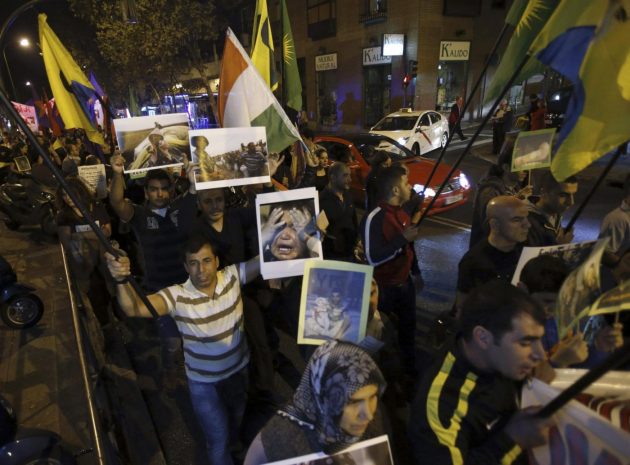
There’s even a dude who came here by bike. He hooked up a GoPro camera to his hard hat, and he’s now riding around the frontline in solidarity with the Kurds.
With the battle of Kobani, the town on the Turkish border under Isis assault since October, in Syria pacifists suddenly reappeared. The pacifists we are used to, a bit messy, a bit shambolic, unmistakable: a guitar, a keffiyeh around their neck. Some of them are doctors, or help with blankets and bread in the refugee camps, some others are here just to provide independent information, to explain the rights of the Kurds in a blog post, a local radio program – they are electricians, clerks, engineers. They are using their leave. There are forgotten wars – who is following South Sudan? Nigeria? – but here, only instance in the world, amnesia is selective.
For the Kurds, yes. For all other Syrians nothing.
Why there’s never been a mobilization for Syria like the one we had for Bosnia, or Irak? For Kosovo? Perhaps, time has come to put it bluntly. There’s never been because the anti-war movement decided to stand on Assad’s side. Today Bashar al-Assad is again a key player, true, and everybody acknowledges that any peace plan, whatever the content, must take him on board: because he didn’t win the war, but nor he lost it – yet, Assad is a key player again because this war has been left to rot for three years. And most of all, it’s one thing to accept, bitterly, that parts of a regime will stay in power, as in the end it often happens in war aftermaths: another thing is to forgive a head of state who drops barrels bombs over his citizens. The right place for Assad isn’t Geneva, the negotiation table, it’s The Hague. The International Criminal Tribunal. Nothing like that, however, is currently being discussed by the left – or whatever the most proper word to use is. The left, simply, stands on Assad’s side because Assad is against the United States.
Or better: because the Arab Spring is a CIA covert operation. I have been told stuff like that many times. Too many. The understanding of the Middle East that prevails among pacifists, among activists, is gloomily old-fashioned, based on a map of the world, and of its balance of power, that doesn’t exist anymore. Today the US are only one of the several players involved – and not always the key player. Yet, for many, too many, the choice is easy. Since the world, for them, is easy: it’s black and white – the question is only one: where are the US standing? And they stand on the opposite side. You speak of 200,000 dead, 3 million refugees, 6 million displaced, and you are replied that “Assad, yet” support the Palestinians, and that’s why they actually want to get rid of him, because he is a bulwark against Israel. Something not even Palestinians have ever believed. Since Palestinians have in fact been a great pretext, for Assad and others alike, to rule through the police, and postpone any reform, any opening to democracy, in a permanent emergency state: because priority was to resist the Zionist enemy.
Despite the hard time, the Arab Spring is still an amazing battle for freedom and dignity, a battle fought with bravery by a generation on the fringes of everything. 20, 30-year-olds comdemned to get by day by day, dispossessed of their life by élites that seized power and wealth – with alliances and connivances cutting across any faith, any religious affiliation. For a journalist who belongs to the same generation of Tahrir square, and in Cairo couldn’t help but notice, torture aside, the striking similarities between Mubarak’s Egypt and Italy: rampant unemployment, corruption, nepotism, state inefficiency – for a 30-year-old excluded by the future, the left was expected to do quite the opposite. To support the Arab Spring.
And more than support: it was expected to take it as an example.
Articolo Precedente
Suruc – a photo

Articolo Successivo
Azzollini, il senatore Ncd e il porto milionario di Molfetta. Mai realizzato






